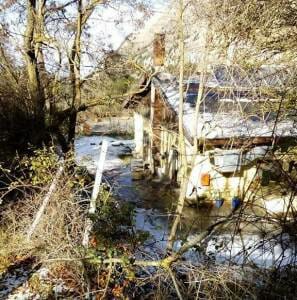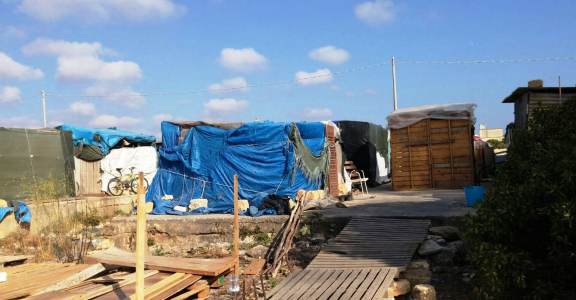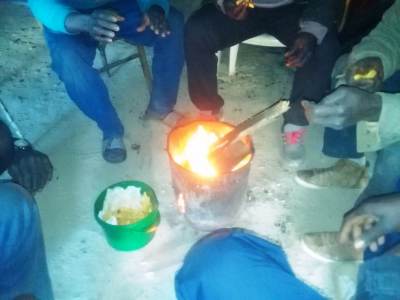Not Everyone Has Something To Celebrate
Even in the festive season we have the task of observing hypocritical statements, mere methods of saving face for our politicans, from Minniti to Gentiloni. At the same time, Italian politicies have been condemned numerous times in the space of a single months, first by the High Commission of the United Nations and then by the Permanent People’s Tribunal: two very different entitites nevertheless united in their condemnation of Italy and Europe, actors complicit in inhumane and criminal policies.
And while our politicians compete on the TV and in the newspapers to give tear-jerking interviews to sweep up some votes, they nevertheless fail to find the time to go to parliament and vote for the ius soli. We can only hope that clear political gestures such as these pull back the wool from over people’s eyes and show the real intentions of deeply racist forces.
Unfortunately, people continue to die at sea, and Christmas is no exception. Indeed, so as to see the nativity scene, or to take photos of a black statuette that arrived with pomp and elegance to the port of Palermo, the silence around the dead was forced to hide itself away: everything had to take second place in order to not disturb our Christmas dinners and raffles.
But for some, there is no Christma, nor New Year’s eve. For some, it is simply the same old story: trying to escape from invisibility every day, from exploitation, attempting to scrape by, without any moment for festivities.
‘B’. has nothing to celebrate anyway, a young man who, after a long period at the ‘Elom’ community for minors in Palermo (despite this being an Initial Reception Centre*), only to then be torn away from Palermo an taken to Licata, to a second level reception centre in the province of Agrigento and far from any social context. ‘B.’ remains all day in bed, and frequently sends us videos and audio clips about his plight, his isolation, his feeling abandoned by everything and everyone. There is no interpreter in the centre, nor adequate professionalism among the staff, who simply send security officers in if the young residents attempt to claim their rights. Even at Christmas, ‘B.’ remained in bed, in the solitude of his bitter life.
The Tunisians stuck inside what remains of the Lampedusa Hotspot also have nothing to celebrate, given that the structure currently seems to act as a detention centre rather than a Hotspot. In an entirely arbitrary manner, hundreds of people are being sent away through collective rimpatriations. On Lampedusa the Tunisians who are forced to wait for a ship that can take them to solid ground are all given a ‘7 day paper’, i.e. an expulsion notice. ‘R.’ went to the extreme, hiding himself – along with others – in the dumpster truck and only just managed to escape with his life. Just like ‘B.’, he too is a victim of this absurd system.
Many of the women hosted in the Extraordinary Reception Centres* in Palermo and its surrounding province, from Balestrate to Altavilla. We continue to receive text messages from ‘F.’ and ‘C.’, residents at one such centre for women in Palermo, who critically report to us the daily lack of interpreters and the lack of professional figures, including legal assistance. They are forced to live in the cold and dampe, given that the buildings have no heating at all. The clothing they have is usually donated by voluntary associations and other citizens; the right to study is almost always violated, aggravating their situation of marginalisation and vulnerability. These are women who are often victims of human trafficking. ‘G.’ is another silent victim of this trafficking network, one that does not even slow down at Christmas – indeed, as she tells it, Christmas is a period with more clients than usual, who are always asking for more. ‘G.’ recently had a miscarriage, the child of the latest act of abuse.
‘I.’ and ‘K.’ also have nothing to celebrate, two young men who live in isolation at Baita del Faggio, surrounded by the snow and abandoned to themselves. The young men constantly complain about the cold because the heating does not always function, often there is no electricity and the snow does the rest of the work. “How can you live in this forest, covered in snow, we can’t live like this, we’re always alone, they’ve removed every human right from us, there’s no heating, there’s no electricity and if we complain, the manager tells us that they’ll chuck us out of Italy, they threaten us all the time.”
The managers at Baita del Faggio and Piano Torre deny this version of events, because the heating is in fact switcjed on at pre-established times, and only in the rooms, while there are gas heaters in the communal rooms (which take a long time to be replaced when they run out). Aside from what the exact truth is, the only certain fact is that the Prefecture has failed to make any decision about places such as Baita del Faggio, in which one simply cannot have a reception centre. Indeed, the Prefecture has continued to open Extraordinary Reception Centres in the middle of mountainous nowheres, places where it is difficult to go to work due to the distance and conditions of the roads, currently covered in deep snow. The young men obviously feel abandoned, and ‘I.’ and ‘K.’ received only snow and ice for Christmas.
The young men who managed to only just flee the jaws of death a few days ago, when a fire overtook the invisible workers’ camp at Campobello, also have nothing to celebrate. ‘T.’, ‘A.’ and ‘E.’ tell us how, like many others, they have remained there and will do so for the whole year in order to find some small jobs. Just over a hundred people remain of the 1,800 who were here earlier this year, who risked death at Christmas in order to fend off the cold – just as Ousmane did indeed die a few years’ back. And when history repeats itself with such clarity this simply means that the institutional authorities are responsable for any resultant deaths. It was only by chance that the gas cannister did not catch fire and that the balance sheet did not contain casualties in the end, While the Ministry of the Interior boasts about humanitarian corridors, these young men have lost everying, from their documents to the money they had earned, simply becoming still more invisible.
Neither did ‘S.’ celebrate anything, a young Somalian woman who Germany sent back to Italy, inasmuch as she is less worthy than Syrians. ‘S.’ arrived in Palermo two days before Christmas; having found hospitality at a Caritas dormitory, she spent the day wandering the city centre aimlessly. She would like to go back to Germany where her boyfriend is waiting for her, but she cannot.
Now that Christmas has passed and soon we will say goodbye to 2017, these invisible people, and many others, can return to filling the pages of our newspapers and at even taking up some of the TV headlines, given the upcoming electoral campaign, which will no doubt speculate on the fate of migrants in the most shameful and sinister fashion.
For our politicans, we hope that they have a 2018 full of situations such as those of our invisible friends. We hope they spend at least one night at Baita del Faggio. We wish them a journey wandering around out cities without knowing where they can go, we wish that they will be the victims of their own policies. Perhaps this way they will take a different road, return people’s dignity, return their freedom and give back that which has been unjustly taken from the impoverished, the sacrificial victims of the “civilised” world.
2017 is coming to an end, and soon we will find ourselves in 2018, in the hope that sooner or later we will be able to write that ‘I.’ and ‘S.’ – and so many others – will finally be able to celebrate a Christmas in person, as free beings.
Happy new year.
Alberto Biondo
Borderline Sicilia
* Initial reception centre = Centro di prima accoglienza
* Extraordinary reception centre = Centro di accoglienza straordinario
Project “OpenEurope” – Oxfam Italia, Diaconia Valdese, Borderline Sicilia Onlus
Translation by Richard Braude





